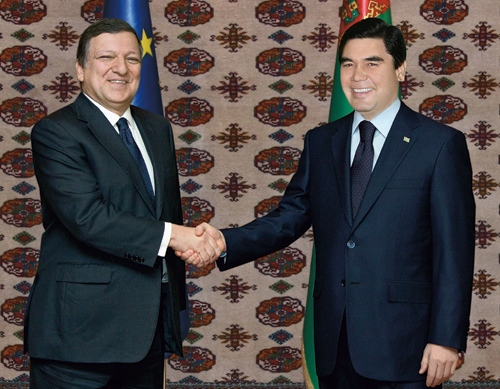
Turkmenistan’s Gas Export Potential: New Implications for Europe
Publication: Eurasia Daily Monitor Volume: 9 Issue: 137
By:

BP’s latest annual Statistical Review of World Energy has revealed Turkmenistan’s proven gas reserves as even bigger than previously assessed (see accompanying article). From Ashgabat’s perspective, European gas markets must look more lucrative and reliable compared with Turkmenistan’s existing export markets in China, Russia, and Iran (let alone the proposed trans-Afghan export route). The westward direction remains the only missing direction for Turkmenistani gas exports. Turkmenistan has started construction of the East-West pipeline, to run from its eastern gas fields to the Caspian coast, there to connect with a westbound trans-Caspian pipeline. Ashgabat proposes to deliver 30 billion cubic meters (bcm) annually through this line, and another 10 bcm annually from its Caspian offshore fields, for onward transportation to Europe after 2016. Turkmenistan plans to finance the overland pipeline from its own budget, but is running into problems with funding and subcontracting some of the work.
Ashgabat adheres to the policy of selling its gas at the country’s borders, without becoming involved in transportation projects beyond its territory. Accordingly, the European Commission seeks to coordinate a trans-Caspian transportation solution, with Azerbaijan as a linchpin. The trans-Anatolia pipeline to Europe, recently initiated by Azerbaijan with Turkey, due on stream by 2016 and scalable up to 30 bcm per year, opens the way for Turkmenistani gas to Europe. The line is so designed to accommodate significant volumes of Turkmenistan’s gas. Without those volumes, the Southern Corridor to Europe would be stunted, and Azerbaijan would not significantly advance from the role of producer to that of a major transit country for energy supplies to Europe (a role that Azerbaijan would also bestow on Turkey in this case).
The US-promoted trans-Afghan pipeline to Pakistan and India (Turkmenistan-Afghanistan-Pakistan-India – TAPI) is an unnecessary political distraction (a distraction admittedly mitigated by Afghanistan’s disorders). TAPI can work against European interests if it is sequenced ahead of a trans-Caspian pipeline bound for Europe. New production in Turkmenistan can only come on stream incrementally. Wrong sequencing of pipelines would be seen as pre-empting new gas production volumes in favor of TAPI, correspondingly delaying the availability of export volumes for Europe.
On July 18, European Commission President Manuel Barroso telephoned the Turkmen President, Gurbanguly Berdimuhamedov, regarding gas deliveries via a trans-Caspian gas pipeline and the planned Southern Corridor to Europe. The Turkmenistani government made public an unusually detailed account of their discussion. Barroso and Berdimuhamedov reaffirmed the “mutual commitment” to ensure deliveries of Turkmenistani gas to Europe and work out the necessary legal and commercial frameworks. They scheduled a high-level meeting of producer, transit, and consumer countries and companies for September in Ashgabat (apparently enlarging on the tripartite working group created in 2011 by the European Commission, Azerbaijan and Turkmenistan). The communique paraphrased Berdimuhamedov alluding to political assurances at the international level for safe transportation of energy supplies to markets (the usual hedge vis-a-vis Russia). Ashgabat’s official account added the comment that “Europe’s ever-growing energy requirements, and Turkmenistan’s strategy to diversify its export routes to international markets, provide the basis for multiple pipeline projects” (TDH, Trend, July 18).
The Council of the European Union (EU’s top foreign policy authority) at the level of foreign affairs ministers endorsed the EU-Azerbaijan-Turkmenistan working group on June 25, and had that communiqué hand-delivered to Berdimuhamedov in Ashgabat. The Council’s document explicitly links a trans-Caspian gas pipeline with the Southern Corridor to Europe (Council’s Conclusions, June 25; Trend, June 26).
On July 5, European Council President Herman van Rompuy held talks with President Ilham Aliyev in Baku on Azerbaijani gas supplies, and possible transit of Turkmenistani gas via trans-Caspian and trans-Anatolia pipelines to Europe. According to van Rompuy in Baku, “The EU regards Azerbaijan as a strategic partner on energy, a reliable supplier, and in the future a reliable transit country [for Turkmenistani gas]…The ongoing negotiations on the Southern Corridor and on the trans-Caspian pipeline are of strategic importance to Azerbaijan and the European Union” (European Council press releases, July 9).
Connecting with European markets is now a high priority in Turkmenistan’s gas export strategy. This necessitates reaching Europe through new pipelines, ahead of global liquefied natural gas (LNG) suppliers that are also targeting European markets. There is interest in Europe for Turkmenistan’s gas, but the interested parties must commit to certain purchase volumes and a transportation solution from Turkmenistan in a timely manner. Failing this, Turkmenistan’s new production volumes will be pre-empted by China, Russia or other destinations for which pipelines are already available or planned.
However, the EU has yet to commit initial funding (whether through the European Commission or the European Investment Bank) to the proposed trans-Caspian pipeline. Turkmenistan is building the East-West pipeline on its territory, aiming to supply the proposed trans-Caspian pipeline from the country’s eastern fields (see above). Azerbaijan is also covering a large share of the trans-Anatolia pipeline’s construction costs. The EU needs to do no less for the proposed trans-Caspian pipeline. Failing that, Turkmenistan’s offer of 30 bcm annually through its East-West pipeline may lapse or even shift northward to Russia, instead of westward to Europe, if the price becomes attractive.
For its part, Ashgabat needs to enter into a production sharing agreement with a leading European producer company or a consortium, onshore in Turkmenistan. Without such an agreement, European companies would hardly risk multibillion dollar investments in exploration, development and transportation. An onshore production sharing agreement with champion companies could bring the more complicated projects on stream sooner and open the export route to Europe. This could boost Turkmenistan’s relationship with Europe in all aspects, including a significantly enhanced Western interest in Turkmenistan’s independence and security.




